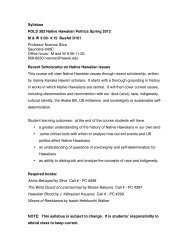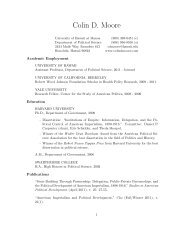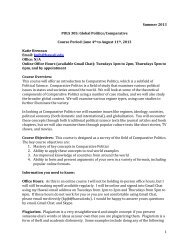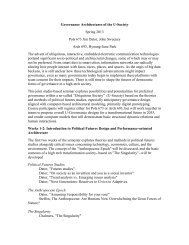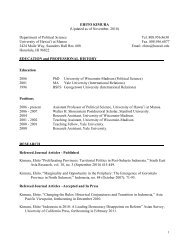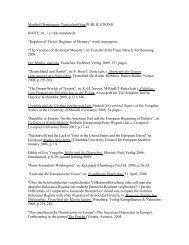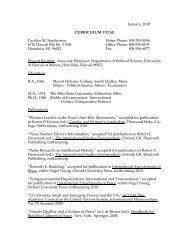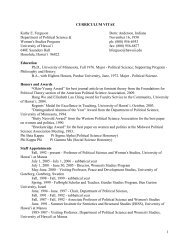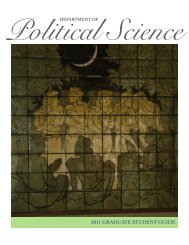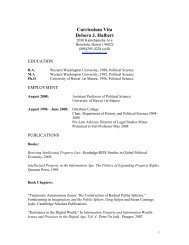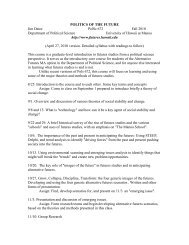syllabus - Department of Political Science
syllabus - Department of Political Science
syllabus - Department of Political Science
You also want an ePaper? Increase the reach of your titles
YUMPU automatically turns print PDFs into web optimized ePapers that Google loves.
POLS 305: COMPARATIVE GLOBAL POLITICS<br />
MW 11:00-12:15 Saunders 624<br />
Instructors: Kate Xiao Zhou, Office Phone 956-8777<br />
Stephen Zierak, Teaching Assistant<br />
Office: 634A Saunders<br />
Office Hours:<br />
E-mails: katezhou@hawaii.edu zierak6@aol.com<br />
Course Objective: To provide students with a basic understanding <strong>of</strong> revolutionary and<br />
evolutionary change in government structures and policies, political responses to crisis,<br />
impacts <strong>of</strong> globalization on domestic policies, demographic politics, energy politics, Middle<br />
East conflict, and the expected internal effects <strong>of</strong> China’s rise as a world power. As a<br />
conceptual frame <strong>of</strong> reference, we will compare liberal and illiberal systems. The interplay<br />
<strong>of</strong> politics and economics will be a focus <strong>of</strong> this course. Our emphasis will be on a country’s<br />
internal governance, and relationships with close neighbors, rather than evaluation <strong>of</strong> its<br />
conduct <strong>of</strong> overall foreign policy.<br />
No textbook is assigned for this course. Readings are articles, and selected chapters from a<br />
variety <strong>of</strong> books. All readings are posted on laulima. Please consult with Pr<strong>of</strong>essor Zhou<br />
or Steve if you are having trouble navigating through laulima, or finding the readings for<br />
the classes.<br />
Course Grading: Grades will be based on your performance in the following areas:<br />
TAKE HOME EXAMS: Take home midterm and take home final will be worth up<br />
to 30 points each on your final grade. These will be distributed on a Monday (see course<br />
outline for dates), and will be collected the following Monday. Questions will be based on<br />
the readings and class presentations. Format will be short essay answers. You may refer<br />
to the readings, to your notes, and to any other independent readings you may consider<br />
relevant.<br />
LAULIMA REFLECTIONS POSTINGS: Each student is responsible for ten<br />
postings on laulima, reflecting his/her opinion on the material presented in the readings or<br />
discussions for a given class (including reactions to any other postings by classmates). This<br />
will begin with the 1/28 class through the 4/15 class. DEADLINE FOR POSTING WILL<br />
BE ONE WEEK AFTER THE GIVEN CLASS! Each quality post will be worth one point<br />
on your final grade, to a maximum <strong>of</strong> 10 points. Those with last names beginning with A<br />
through K will be responsible for Group One Monday class dates. Those with last names<br />
beginning with L through Z will be responsible for the Group Two Wednesday class dates.<br />
Steve will establish a discussion thread for each class date. Consult with him if you don’t<br />
know how to post to a thread on laulima.
Group One: 1/28, 2/4, 2/11, 2/25, 3/4, 3/11, 3/18, 4/1, 4/8, and 4/15.<br />
Group Two: 1/30, 2/6, 2/13, 2/20, 2/27, 3/6, 3/13, 3/20, 4/3, and 4/10.<br />
PRE-CLASS READING ASSIGNMENT POSTING: Each student is responsible<br />
for selecting one reading, and posting a summary <strong>of</strong> the material and three questions for<br />
discussion on laulima. Because we want to work good questions into class discussion, it is<br />
essential you post prior to the class in which the reading is to be discussed. DEADLINE<br />
FOR POSTING THE PCRA SUMMARY AND 3 QUESTIONS WILL BE ONE WEEK<br />
BEFORE THE CLASS IN WHICH THE READING IS TO BE DISCUSSED! You may<br />
select a reading assigned for classes between 1/30 and 4/17. We will establish an<br />
assignment list at our third class meeting. The PCRA is worth 7.5 points on your final<br />
grade. You will need to establish a discussion thread on laulima titled with the name <strong>of</strong> the<br />
reading assignment. If you do not know how to do this on laulima, consult with Steve.<br />
ATTENDANCE: It is important that you attend class to benefit from the<br />
discussions <strong>of</strong> the material. Each student is responsible for signing the class sign up sheet<br />
before leaving each class. Good attendance is worth 15 points on your final grade. One<br />
point will be subtracted for every absence beyond three. Habitual good attendance is an<br />
easy 15 points on your grade.<br />
CLASS PARTICIPATION: We want to know what you think about the materials<br />
assigned, and see some debate among your classmates. Speaking up regularly in class can<br />
earn you up to 7.5 points on your final grade.<br />
Along with the 100 maximum points above, there will also be extra-credit opportunities<br />
announced by Pr<strong>of</strong>essor Zhou over the course <strong>of</strong> the semester.<br />
COURSE OUTLINE:<br />
COURSE INTRODUCTION* 1/7<br />
(1) COMPARATIVE REVOLUTIONS<br />
Concepts as Applied to US/French Revolutions# 1/9<br />
R.J. Rummel: American vs. French Revolution (8 pages)<br />
Gentz: American & French Revolutions (50 pages)<br />
Russian & Chinese Revolutions* 1/14<br />
Steve Kreis: The History Guide, Lectures 5-7 (25 pages)<br />
Jennifer Cucchise: The Causes and Effects <strong>of</strong> the Chinese Civil War (pages 40-71)<br />
Revolutions <strong>of</strong> the Future? Unorganized Power & Networks* 1/16<br />
Kate Zhou: China in the Information Age—The Strength <strong>of</strong> Unorganized Power
Brafman & Beckstrom: Starfish and the Spider<br />
Chapter 2: The Spider, the Starfish, and the President <strong>of</strong> the Internet (28pgs)<br />
Chapter 4: Standing on Five Legs (24 pages)<br />
Chapter 9: The New World (10 pages)<br />
Nathan Harden: The End <strong>of</strong> the University as We Know It (10 pages)<br />
January 21: Martin Luther King Holiday<br />
(2) LIBERALISM & ILLIBERALISM<br />
Rule <strong>of</strong> Law# 1/23<br />
Brian Tamanaha: On the Rule <strong>of</strong> Law<br />
Chapter 3: Liberalism (15 pages)<br />
Chapter 4: Locke, Montesquieu, the Federalist Papers (13 pages)<br />
Chapter 5: Conservatives Warn (13 pages)<br />
Chapter 9: Three Themes (13 pages)<br />
US Founding vs. Progressivism/Modern “Liberalism”# 1/28<br />
Steve Zierak: Reviews <strong>of</strong> Hillsdale College Constitution 101 (32 pages)<br />
Amity Shlaes: The Forgotten Man<br />
Introduction (11 pages)<br />
Friedrich Hayek’s Classical Liberalism* 1/30<br />
The Fatal Conceit: Chapter 2: Origins <strong>of</strong> Liberty, Property, and Justice (9 pages)<br />
The Fatal Conceit: Chapter 5: The Fatal Conceit (22 pages)<br />
The Road to Serfdom: Chapter 4: The “Inevitability” <strong>of</strong> Planning (9 pages)<br />
The Road to Serfdom: Chapter 5: Planning and Democracy (22 pages)<br />
Hernando De Soto’s Mystery <strong>of</strong> Capitalism in the Third World* 2/4<br />
Chapter 1: The Five Mysteries <strong>of</strong> Capital (13 pages)<br />
Chapter 3: The Mystery <strong>of</strong> Capital (29 pages)<br />
Chapter 7: By Way <strong>of</strong> Conclusion (22 pages)<br />
Stalinism (1930’s) & Maoism (Great Leap Forward/Cultural Revolution)* 2/6<br />
Steven Rosenfielde: Stalinism in Post Communist Perspective (29 pages)<br />
Daniel Southerland: Uncounted Millions: Mass Deaths in Mao’s China (13 pages)<br />
Market Socialism# 2/11<br />
Janos Kornai: Market Socialism Revisited (41 pages)<br />
Japanese Industrial Policy* 2/13<br />
Tetsuji Okazaki: Government-Firm Relationship (29 pages)<br />
Michael Boskin: Picking Losers, Killing Winners (7 pages)<br />
February 18: Presidents’ Day Holiday
(3) ECONOMIC CRISIS & POLITICAL RESPONSE<br />
Post WW1 Germany* 2/20<br />
Roger Myerson: <strong>Political</strong> Economics and the Weimar Disaster (30 pages)<br />
Calvin Hoover: Dictator’s March (8 pages)<br />
Totalitarianism Hitler Group Paper (10 pages)<br />
1970’s & 1980’s Britain & US* 2/25<br />
Laffer Associates: Supply Side Economics (26 pages)<br />
William Niskanen: Reaganomics (5 pages)<br />
Thayer Watkins: Privatization in the UK (4 pages)<br />
Douglas McWilliams: Thatcherism—20 Years On (3 pages)<br />
2008 US Financial Crisis# 2/27<br />
Steve Zierak: Notes on Terms & Timelines<br />
(Based on Morgenson & Rosner’s Reckless Endangerment)<br />
TAKE HOME MIDTERM (BASED ON CLASSES THROUGH 2/27)<br />
DISTRIBUTED/POSTED MONDAY 2/25<br />
DUE NO LATER THAN MONDAY 3/4<br />
(4) POLITICAL/ECONOMIC TRANSITIONS<br />
Russia vs. China: Reform from Below & Above* 3/4<br />
Zhou & Gregory: Why China Won and Russia Lost (23 pages)<br />
Kate Zhou: China’s Long March to Freedom—Grassroots Modernization<br />
Chapter 4: Capitalism with Chinese Characteristics and the Basis <strong>of</strong><br />
Civil Society (24 pages)<br />
European Union# 3/6<br />
Susan Nello: The European Union<br />
Chapter 2: Brief History <strong>of</strong> European Integration (26 pages)<br />
Chapter 10: Long Road to Economic and Monetary Union (16 pages)<br />
Eastern Europe after 1989# 3/11<br />
Milada Vachudova: Europe Undivided<br />
Introduction (9 pages)<br />
Chapter 1:<strong>Political</strong> Competition & Reform Trajectories (14 pages)<br />
Chapter 2:Liberal & Illiberal Democracy after Communism (38 pages)<br />
Chapter 4:Impact <strong>of</strong> Passive Leverage:EU & Eastern Europe1989-94(24 pgs)<br />
(5) CRONY CAPITALISM<br />
Russia & China* 3/13<br />
Guriev & Rachinsky: Oligarchs—Past or Future <strong>of</strong> Russian Capitalism (35 pages)<br />
Chris McNulty: Institutional Contours <strong>of</strong> China’s Emergent Capitalism (11 pages)
United States# 3/18<br />
Peter Schweizer: Throw Them All Out<br />
Chapter 2: Crisis for All, Opportunity for Some (17 pages)<br />
Chapter 5: Spreading the Wealth to Billionaires (30 pages)<br />
Chapter 9: Why This Matters (16 pages)<br />
Chapter 10: What Needs to Be Done (10 pages)<br />
Hawaii* 3/20<br />
King & Roth: Broken Trust<br />
Appendix: Charitable Trust Provisions (2 pages)<br />
Introduction (10 pages)<br />
Chapter 12: Time to Say No More (14 pages)<br />
Chapter 15: A World Record for Breaches <strong>of</strong> Trust (15 pages)<br />
Chapter 19: End <strong>of</strong> the Line (20 pages)<br />
Chapter 21: Eternal Vigilance (15 pages)<br />
Daniel Brackins: The Negative Effects <strong>of</strong> the Jones Act on the Economy <strong>of</strong><br />
Hawaii (20 pages)<br />
March 25-29: Spring Recess<br />
(6) GLOBALIZATION<br />
WTO & Economic Integration* 4/1<br />
Susan Hainsworth: Sovereignty, Economic Integration, & WTO (40 pages)<br />
Stuart Malawer: US-China WTO Litigation (6 pages)<br />
Human Rights Treaties* 4/3<br />
Summary <strong>of</strong> UN Agreements on Human Rights (5 pages)<br />
Human Rights Watch: US Ratification <strong>of</strong> Human Rights Treaties (9 pages)<br />
Report <strong>of</strong> USA (29 pages)<br />
UN: Membership <strong>of</strong> Human Rights Council (3 pages)<br />
(7) OIL, ENERGY, & THE MIDDLE EAST<br />
Energy & Markets# 4/8<br />
IEA: World Energy Outlook 2012 (6 pages)<br />
Bill Kovarik: Oil Reserve Fallacy (15 pages)<br />
Joanne Nova: The Skeptic’s Hand Book (16 pages)<br />
Arab-Israeli Negotiating Positions & Military Capabilities* 4/10<br />
Barry Rubin: Israeli-Palestinian Negotiating Positions (6 pages)<br />
CSIS: Arab-Israeli Military Balance 2010 (55 pages)
(8) POLITICS OF POPULATION: DEMOGRAPHICS AND IMMIGRATION<br />
Demographic Trends# 4/15<br />
Ben Wattenberg: Fewer<br />
Chapter 1: The Story <strong>of</strong> This Book (14 pages)<br />
Chapter 13: Numbers Matter (16 pages)<br />
Chapter 4: America the Exceptional: Baby Makers (7 pages)<br />
Chapter 5: America the Exceptional: Immigrant Takers (16 pages)<br />
Economic Dilemmas & Immigration# 4/17<br />
George Magnus: The Age <strong>of</strong> Aging<br />
Chapter 1: Introducing a New Age (10 pages)<br />
Chapter 4: The Economics <strong>of</strong> Aging—What Is To Be Done? (34 pages)<br />
Chapter 9: Will Immigration Solve Aging Society Problems? (28 pages)<br />
(9) CHINA AS A RISING POWER<br />
China’s Economic & <strong>Political</strong> Goals/Situation* 4/22<br />
Martin Jacques: China as an Economic Superpower (43 pages)<br />
China’s Military & Foreign Policy Goals/Situation# 4/24<br />
US <strong>Department</strong> <strong>of</strong> Defense: Military & Security Developments Involving People’s<br />
Republic <strong>of</strong> China 2011 (Executive Summary and pages 1-46)<br />
China as A/The Major World Power* 4/29<br />
Martin Jacques: When China Rules the World (50 pages)<br />
Martin Jacques: The Eight Differences That Define China (20 pages)<br />
TAKE HOME FINAL (BASED ON CLASSES THROUGH 4/24)<br />
DISTRIBUTED/POSTED MONDAY 4/22<br />
DUE NO LATER THAN MONDAY 4/29<br />
WRAP-UP DISCUSSION* 5/1


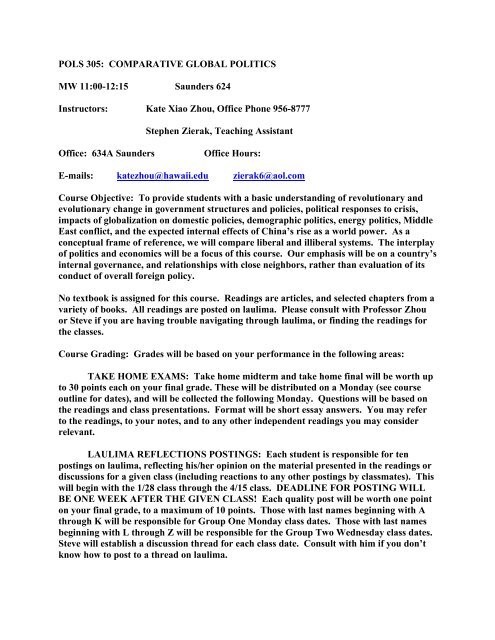
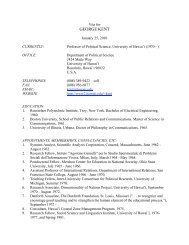
![Fall 2012 POLS 620 Syllabus [PDF] - Department of Political Science](https://img.yumpu.com/25416938/1/190x245/fall-2012-pols-620-syllabus-pdf-department-of-political-science.jpg?quality=85)
